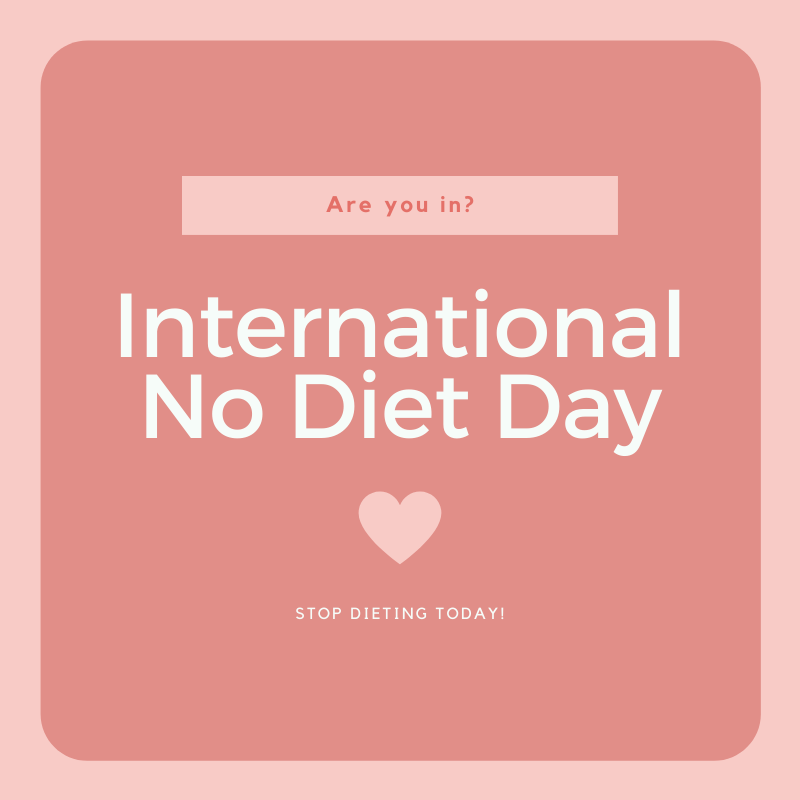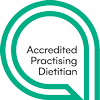Changing the way we think about food and our bodies
Chances are you may have tried to lose weight at one time or another or you know someone who has. That’s not surprising given that we’re constantly exposed to the message that being slim equals health and happiness. The pressure to lose weight, and conform to society’s body standards is enormous. But being slim doesn’t guarantee health or happiness. In fact, for many people, chronic dieting has had negative consequences for their physical and mental health. Some of these consequences include food obsession, unhealthy restriction of food, body dissatisfaction, eating disorders and low self-esteem. And unintentionally passing these behaviours down to their children.
If you or someone you know has experienced the negative consequences of dieting, why not use International No Diet Day on May 6 as a starting point to:
- form a healthier relationship with food and your body?
- improve your child’s relationship with food and their body?
- help change the narrative around dieting and weight loss?
What is International No Diet Day?
When British feminist Mary Evans Young first invited friends to “Ditch that Diet” in 1992, she probably didn’t expect it to become a global movement that has helped many people form a healthier relationship with food and their bodies. Recovering from the eating disorder anorexia nervosa at the time, Mary is frequently credited with starting the British anti-diet movement. While some people see International No Diet Day simply as a day to enjoy foods they wouldn’t normally allow themselves, it’s actually intended to raise awareness of the dark side of dieting and diet culture. Originally intended to be a UK-based event, International No Diet Day is now an annual event worldwide that aims to:
- raise awareness of and help end weight discrimination, weight bias and weight stigma
- remember people who are suffering and recovering from eating disorders
- promote body acceptance and body shape diversity.
- raise awareness about the dangers of dieting and its’ false promises (health and happiness).
15 ways you can observe International No Diet Day
International No Diet Day is a good day to choose health over dieting, and start healing your relationship with food and your body. Here are a few ways you can start:
- Show your support for International No Diet Day by wearing a light blue ribbon.
- Call a friend or two and tell them about this day.
- Compliment your partner, kids, family members, friends and colleagues on their skills, achievements, and contributions instead of making compliments on their appearance.
- Reserve a table for lunch or dinner at one of your favourite places for you and your partner, your family or a good friend and really enjoy the food you choose (minus the guilt).
- If you can’t enjoy a meal out, why not try being adventurous and cooking something you have always wanted to try?
- Post something you enjoyed eating on this day on social media – you never know who you might inspire. Don’t forget to use the hashtag: #NoDietDay!
- Declare a day free of talk about dieting, weight and shape in your home or office environment. Better still, declare your home permanently free of diet talk and diet culture.
- Put the bathroom scales away – or throw them out – and stop evaluating your self-worth based on a number on a clothes’ label. Instead, embrace and celebrate the things that truly make you great like your sense of humour, your kindness, generosity etc.
- Make a list of things you would like to do apart from dieting like learn a new language or other skill and make plans on how to put them into practice.
- Throw away all the diet books and meal plans you own. Neither of these things take into account how hungry you might be, what you feel like eating, your food preferences or satisfaction.
- Try going without your Fitbit for a day, or longer. Try moving in a way that brings you joy and makes you feel good.
- Think about how you can treat your body with more kindness and appreciation.
- Challenge the idea of one “right” body shape and embrace body diversity.
- Eat what you love with people you love. Allow yourself to eat food just because it tastes good. Social connection is important for health.
- Change the way you talk about food and avoid using words like “good,” “bad,” “junk” “healthy”, and “unhealthy”.
- Dig a little deeper to find out more about the false promises the diet industry sells us.
Not dieting frees us to focus on health-promoting behaviours.
Choosing NOT to engage in dieting behaviour doesn’t mean we don’t care about health. You can take care of your health without dieting, tracking every single bite of food you to eat, or weighing yourself. Here’s how:
- Move your body in a way you enjoy
- Get enough quality sleep
- Find activities that bring you joy and a sense of purpose
- Eat a variety of foods, preferably with others
- Manage stress in healthy ways
Have a fabulous day today as you celebrate the fact that you are so much more than the number on the bathroom scales!
Ready to take the next step? Contact me and request a complimentary call to find out more about Intuitive Eating and how you can make peace with food and your body and truly nourish yourself – body, mind and soul.






